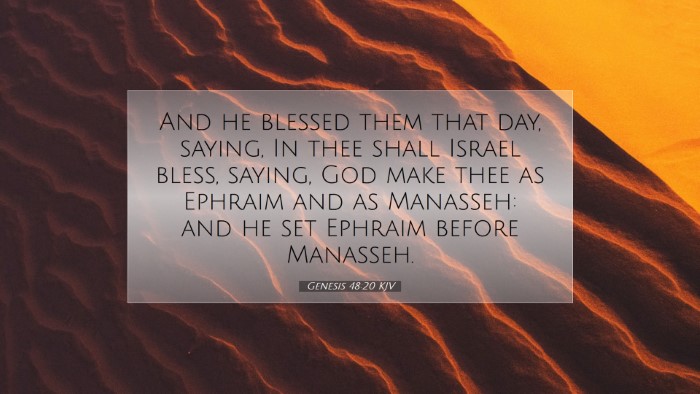Bible Commentary on Genesis 48:20
Genesis 48:20 (KJV): "And he blessed them that day, saying, In thee shall Israel bless, saying, God make thee as Ephraim and as Manasseh: and he set Ephraim before Manasseh."
Introduction
The narrative in Genesis 48 presents a profound moment in the story of Jacob (Israel) as he blesses the sons of Joseph, Ephraim and Manasseh. This passage is rich in theological and historical significance and serves as a pivotal point for understanding the future of the tribes of Israel. The blessing bestowed by Jacob is not merely a familial gesture but carries deep implications for the identity and legacy of the Israelite people.
Contextual Overview
As Jacob nears the end of his life, he gathers Joseph and his sons for a blessing. Jacob's blessing serves to reaffirm God's covenant with Abraham, Isaac, and Jacob, and it highlights the continuity of the Israelite lineage. Here, Jacob adopts Joseph's sons, granting them equal status with his own sons and setting the stage for their prominence among the tribes of Israel.
The Blessing Explained
Matthew Henry notes that Jacob's declaration—“In thee shall Israel bless”—indicates the significance of Ephraim and Manasseh in the future national identity of Israel. The use of these names in blessings underscores their esteemed positions. This statement prepares the ground for the later usage of Ephraim's name to frequently refer to the northern kingdom of Israel in contrast to Judah.
The Significance of Ephraim and Manasseh
- Ephraim: Jacob intentionally places Ephraim before Manasseh, signifying God’s choice of the younger over the elder, which resonates with the theme seen throughout Genesis (e.g., Isaac over Ishmael, Jacob over Esau). This foreshadows Ephraim's eventual prominence among the tribes.
- Manasseh: Represented as the firstborn, Manasseh does receive a blessing but underscores the theme of God's sovereign choice that is often contrary to human expectations.
Theological Implications
Albert Barnes emphasizes the theological depth in Jacob’s blessings, suggesting their prophetic nature. The statement that “God make thee as Ephraim and as Manasseh” becomes a common benediction among the Israelites, reflecting their desired attributes—strength and fertility, respectively.
The Nature of God's Blessing
The blessing signifies not only physical prosperity but also spiritual strength. The mention of God making the boys as Ephraim and Manasseh embodies a deeper longing for divine favor and covenant faithfulness, which is a recurring theme in Scripture. This blessing serves as a reminder for believers about the divine origin of true prosperity and the necessary attributes of faith and endurance in God's covenant community.
Implications for Church and Ministry
For pastors and theologians, this passage invites reflection on the role of blessing in community and spiritual formation. The act of blessing holds communal significance, representing a transfer of divine favor and calling upon future generations to remain steadfast in faith. It poses important questions about how blessings are integrated into Church life.
Application in Leadership and Ministry
- Church leaders are called to both bless and equip their congregations, understanding the weight of their words and actions in the spiritual development of others.
- Ministry should reflect the inclusivity present in Jacob’s blessing—where both Ephraim and Manasseh are acknowledged, promoting unity within diversity.
- Consideration of the generational impact of blessing—a reminder to invest in the spiritual well-being of the next generation.
Conclusion
Genesis 48:20 encapsulates a critical moment in the unfolding narrative of Israel’s history and serves as a bridge connecting past promises to future realities. The blessings pronounced by Jacob not only set the trajectory for Ephraim and Manasseh but also resonate throughout Israel's history, emphasizing God’s sovereignty in choosing and blessing His people. For contemporary readers, this passage beckons a deeper understanding of the blessings we carry and pass on, within both familial settings and the broader community of faith.


